The Evidence
Hundreds of scientific studies have been conducted on the benefits of the Transcendental Meditation technique at more than 200 independent universities and research institutions worldwide during the past 40 years.
The National Institutes of Health have awarded over $26 million to research the effectiveness of TM for reducing stress and improving heart health. Findings have been published in leading, scientific journals, including The American Journal of Cardiology and the American Heart Association’s Hypertension and Stroke. Key findings include:
Elevated Performance
TM has repeatedly demonstrated its ability to enhance both productivity and satisfaction in one’s personal and professional life.
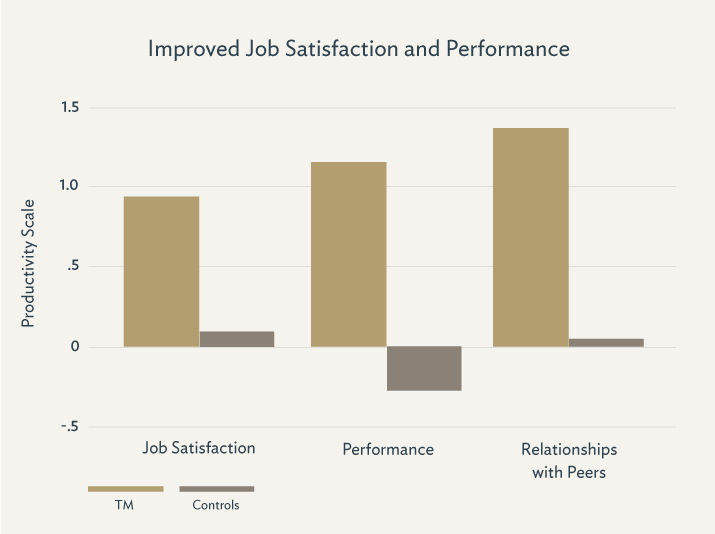
Academy of Management Journal 17: 362-368, 1974
- Improved productivity (Anxiety, Stress, and Coping, 1993)
- Increased job satisfaction (Anxiety, Stress, and Coping, 1993)
- Broad developments in creativity and intelligence (Intelligence, 2001)
- Sharper focus and wider comprehension (Perceptual and Motor Skills,1974)
- Increased self-actualization (Journal of Social Behavior and Personality, 1991)
Optimized Brain Functioning
The prerequisites to peak performance – focus, creativity, broad comprehension, proactivity and planning – occur when the brain, and particularly the prefrontal cortex, is functioning coherently. Several rigorous studies have demonstrated that Transcendental Meditation – more than any other technique – enhances the brain’s coherent functioning.
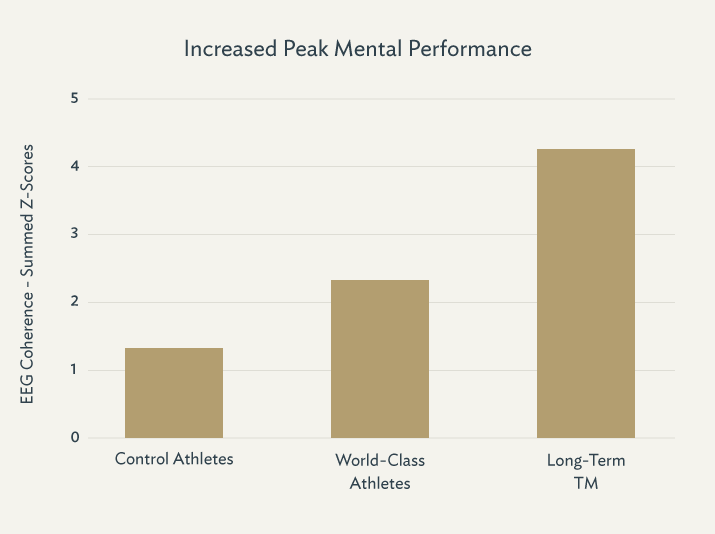
Scandinavian Journal of Medicine and Science in Sports 21: 32-41, 2009
- Increased peak mental performance (Scandinavian Journal of Medicine and Science in Sports, 2009)
- Improved brain functioning outside meditation (International Journal of Neuroscience, 2006)
- Global alpha coherence during meditation (Consciousness and Cognition, 1999)
Reduced Stress and Anxiety, Increased Energy
Workplace stress is regarded as one of the foremost epidemics in our time – hampering productivity and job satisfaction and increasing risk of mental and physical illness. For professionals under high stress, the TM technique will prove an invaluable tool for achieving sustained levels of performance.
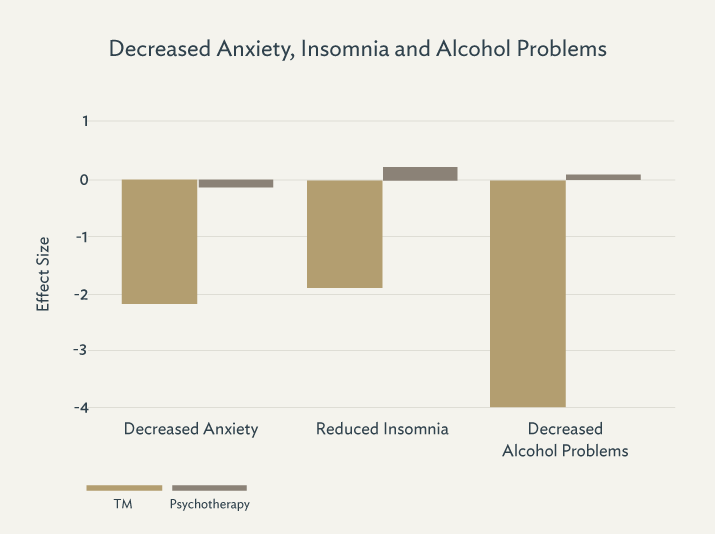
Journal of Counseling and Development 64: 212-215, 1985
- Deep rest (American Psychologist, 1987)
- 42% decrease in insomnia (Journal of Counseling and Development, 1985)
- 25% decrease in plasma cortisol levels (Hormones and Behavior, 1978)
- Greater resistance to stress (Psychosomatic Medicine, 1973)
- 40% reduction in psychological distress, including stress and depression (American Journal of Hypertension, 2009)
- 33% decrease in anxiety (Journal of Alternative and Complementary Medicine, 2013)
Increased Work-Life Balance
While America ranks high on any measure of wealth, it continues to score near the bottom of work-life balance ratings. Through helping to relieve stress and tension and increasing energy, TM allows professionals to have more left over at the end of the day – which naturally translates into improved family relationships and satisfaction with their quality of life.
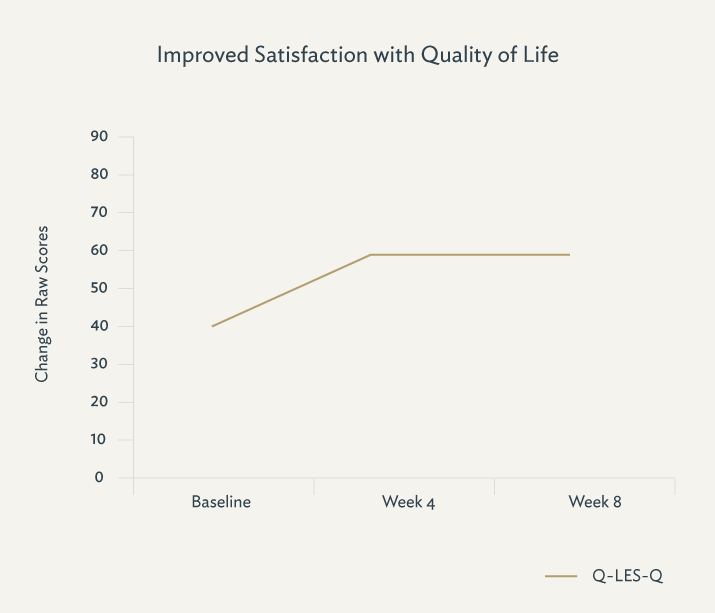
Military Medicine 176 (6): 626-630, 2011
- 30% improvement in satisfaction with quality of life (Military Medicine, 2011)
- Improved relationships among family members (Journal of Counseling and Development, 1985)
- Improved work and personal relationships (Anxiety, Stress, and Coping, 1993)
- Younger biological age (International Journal of Neuroscience, 1982)
Better Heart Health
Cardiovascular disease continues to be the number one cause of death in the United States. The following findings, largely produced from long-term National Institutes of Health-funded studies, are unprecedented.
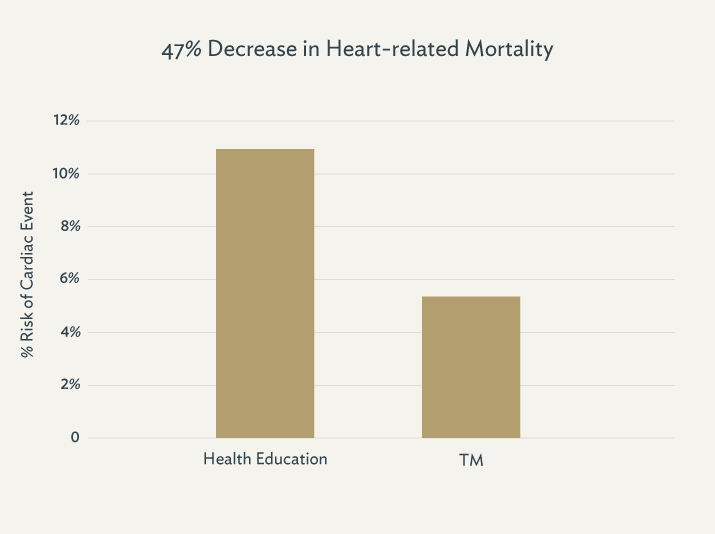
Circulation: Cardiovascular Outcomes 5: 750–758, 2012
- 47% reduction in heart attacks, strokes and mortality (Circulation: Cardiovascular Quality and Outcomes, 2012)
- Reduced high blood pressure – on par with first-line antihypertensive medication (American Journal of Hypertension, 2008)
- Reversal of atherosclerosis (Stroke, 2000)
- Decreased insulin resistance (Archives of Internal Medicine, 2006)
- 13% annual reduction in medical expenditures (American Journal of Managed Care, 1997)
Read the American Heart Association’s clinical recommendation on the Transcendental Meditation technique.
Further Reading
For more information on the benefits of the TM technique in personal and professional life, purchase a copy of Transcendence: Healing and Transformation through Transcendental Meditation. A 2011 New York Times best-selling book, Transcendence was written by Dr. Norman E. Rosenthal, MD, a world renowned medical researcher credited with the discovery of Seasonal Affective Disorder (SAD) and the development of light therapy treatments. xx